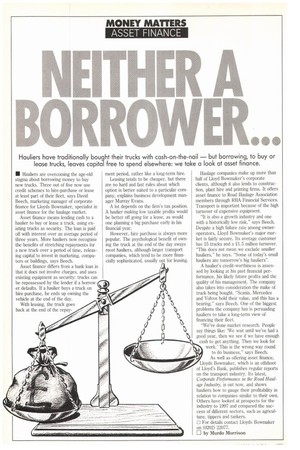MONEY MATTERS ASSET FINANCE
Page 38

If you've noticed an error in this article please click here to report it so we can fix it.
• Hauliers are overcoming the age-old stigma about borrowing money to buy new trucks. Three out of five now use credit schemes to hire-purchase or lease at least part of their fleet, says David Beech, marketing manager of corporate finance for Lloyds Bowmaker, specialist in asset finance for the haulage market.
Asset finance means lending cash to a haulier to buy or lease a truck, using existing trucks as security. The loan is paid off with interest over an average period of three years. More hauliers now recognise the benefits of stretching repayments for a new truck over a period of time, releasing capital to invest in marketing, computers or buildings, says Beech.
Asset finance differs from a bank loan in that it does not involve charges, and uses existing equipment as security: trucks can be repossessed by the lender if a borrower defaults. If a haulier buys a truck on hire purchase, he ends up owning the vehicle at the end of the day.
With leasing, the truck goes back at the end of the repay
ment period, rather like a long-term hire.
Leasing tends to be cheaper, but there are no hard and fast rules about which option is better suited to a particular company, explains business development manager Murray Evans.
A lot depends on the firm's tax position. A haulier making low taxable profits would be better off going for a lease, as would one planning a big purchase early in his financial year.
However, hire purchase is always more popular. The psychological benefit of owning the truck at the end of the day sways most hauliers, although larger transport companies, which tend to be more financially sophisticated, usually opt for leasing. Haulage companies make up more than half of Lloyd Bowmaker's corporate clients, although it also lends to construction, plant hire and printing firms. It offers asset finance to Road Haulage Association members through RI-IA Financial Services. Transport is important because of the high turnover of expensive equipment.
"It is also a growth industry and one with a historically low risk," says Beech. Despite a high failure rate among owneroperators, Lloyd Bowmaker's major market is fairly secure. Its average customer has 15 trucks and a 2.5 million turnover. "This does not mean we exclude smaller hauliers," he says. "Some of today's small hauliers are tomorrow's big hauliers".
A haulier's credit-worthiness is assessed by looking at his past financial performance, his likely future profits and the quality of his management. The company also takes into consideration the make of truck being bought. "Scania, Mercedes and Volvos hold their value, and this has a bearing," says Beech. One of the biggest problems the company has is persuading hauliers to take a long-term view of financing their fleet.
"We've done market research. People say things like: 'We wait until we've had a good year, then we see if we have enough cash to get anything. Then we look for work.' This is the wrong way round to do business," says Beech.
As well as offering asset finance, Lloyds Bowmaker, which is an offshoot of Lloyd's Bank, publishes regular reports on the transport industry. Its latest, Corporate Performance in the Road Haulage Industry, is out now, and shows hauliers how to gauge their profitability in relation to companies similar to their own. Others have looked at prospects for the industry to 1997 and compared the success of different sectors, such as agriculture, tippers and tankers.
El For details contact Lloyds Bowmaker on (0202) 22077.
by Murdo Morrison












































































































